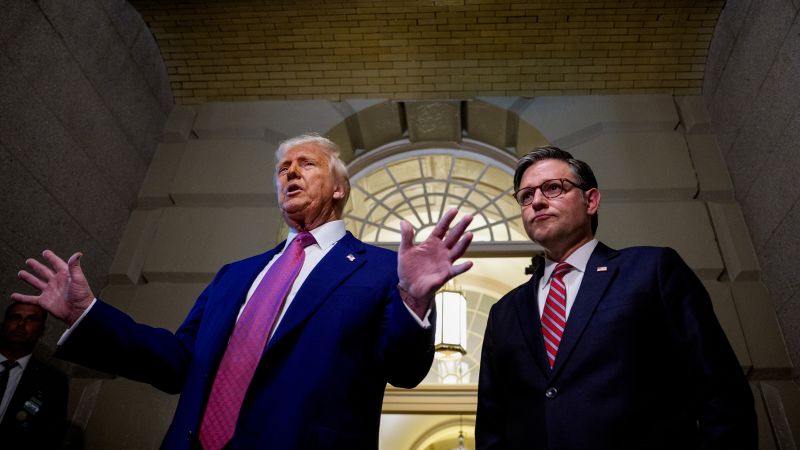The influence of President Donald Trump and House Speaker Mike Johnson is under intense scrutiny as GOP leaders strive to secure a legislative victory by the July Fourth holiday. The challenge is formidable: the newly Senate-approved multi-trillion-dollar bill must pass through a deeply divided House without amendments to meet the self-imposed deadline.
The Senate’s passage on Tuesday marked a significant victory for Trump, who invested considerable effort in rallying Republican support for a bill that includes tax cuts and increased funding for the Pentagon and border security. However, it also features contentious spending cuts, notably the largest reduction of the federal safety net in decades. House GOP leaders, according to multiple sources, are optimistic about passing the bill, but it will require significant political maneuvering.
House Divisions and Strategic Challenges
Speaker Mike Johnson faces a delicate balance, with only three votes to spare. He is caught between centrists and right-wing hardliners, each with their own demands. The bill’s passage could define Trump’s second term, yet the process has been marred by GOP infighting, raising concerns about its impact on the 2026 midterms.
If successful, the bill would bolster Trump’s legacy on border security and tax policy, fulfilling campaign promises such as eliminating taxes on tips and overtime pay, while also aiming to curb federal spending by imposing work requirements for Medicaid and SNAP recipients.
Senate Amendments Stir Controversy
The legislative battle has not been without drama. Over the weekend, Senator Thom Tillis shocked Washington by announcing he would not seek reelection after opposing Trump’s bill on the Senate floor. Following a threat from Trump to primary him, Tillis withdrew from the race entirely.
These high-stakes moments are expected to continue as the House reconvenes. Johnson faces discontent within his ranks over the Senate’s amendments, casting doubt on the bill’s fate. Before a final vote, the House must pass a procedural vote on the rule, which some conservatives threaten to oppose, complicating Johnson’s task.
Procedural Hurdles and Internal Tensions
The House Rules Committee advanced the rule for Trump’s agenda in the early hours of Wednesday after a marathon 12-hour session. GOP Representatives Ralph Norman and Chip Roy, vocal critics of the Senate’s version, joined Democrats in opposing the rule’s advancement.
Speaker Johnson held a call with Dr. Mehmet Oz and the Republican Main Street Caucus, a group of centrist Republicans uneasy about the Senate’s health provisions. “There is a lot of angst and frustration,” one caucus member described the mood.
Centrists Versus Hardliners
House GOP centrists are grappling with new Senate provisions, such as the removal of Medicaid funding from Planned Parenthood for a year, a goal for social conservatives but a point of contention for moderates. Johnson also needs to appease hardliners like Rep. Chip Roy, who argue the bill doesn’t sufficiently reduce the deficit.
Logistical Challenges and Weather Concerns
As of Tuesday evening, Republican and Democratic leaders were working to ensure their members’ attendance for the crucial vote, with tight margins meaning even a single absence could sway the outcome. East Coast storms caused flight cancellations and delays, complicating travel plans for lawmakers.
“We’re monitoring the weather closely. We have to figure that out,” Speaker Johnson told reporters. “We’re not sure yet. There’s a lot of delays right now, so that’s part of the problem.”
The coming days will be pivotal for Trump’s legislative agenda. Success in the House could solidify his policy goals, while failure may exacerbate existing divisions within the GOP and impact future electoral prospects.
 US to Release Billions of Flies to Combat Flesh-Eating Pest Threatening Livestock
US to Release Billions of Flies to Combat Flesh-Eating Pest Threatening Livestock Seafood Deregulation Sparks Concerns Over Sustainability and Supply
Seafood Deregulation Sparks Concerns Over Sustainability and Supply Urban Wildlife Evolution Influenced by Religion, Politics, and War
Urban Wildlife Evolution Influenced by Religion, Politics, and War Bryan Kohberger’s Expected Plea Deal in Idaho Student Murders Leaves Unanswered Questions
Bryan Kohberger’s Expected Plea Deal in Idaho Student Murders Leaves Unanswered Questions Dolphin Echolocation: A Sensory Experience More Like Touch Than Sight
Dolphin Echolocation: A Sensory Experience More Like Touch Than Sight